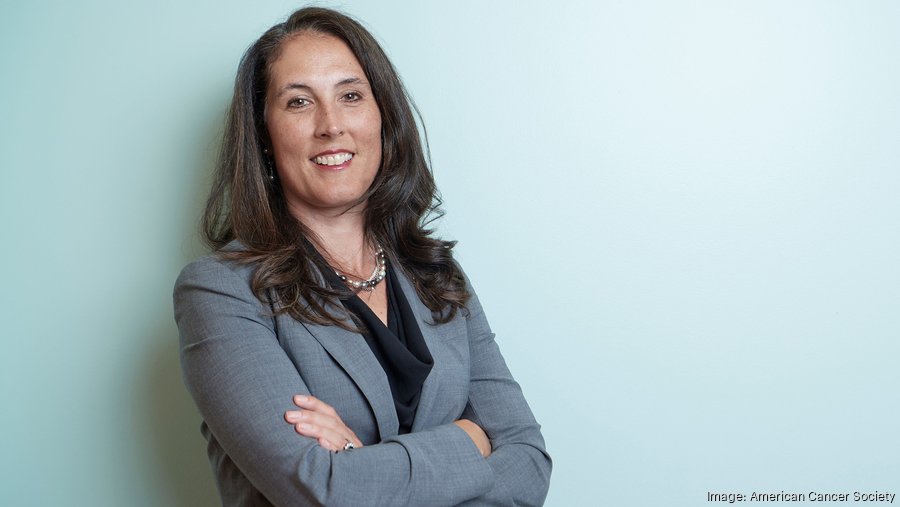Karen Knudsen thought she knew about the American Cancer Society from her nearly seven years leading Jefferson Health's Sidney Kimmel Cancer Center in Philadelphia. What she soon learned being named CEO of ACS in June 2021: Her new organization was bigger and more influential than she ever imagined. The Philadelphia-based Knudsen recently spoke with Atlanta Business Chronicle broadcast editor Crystal Edmonson about her first year at ACS and the organization’s key areas of focus coming out of the pandemic. What follows is an edited transcript of their conversation.
Most people have been focused on Covid-19 since 2020. A lot of attention focused there, but cancer didn’t go away. What has happened in the past two years with regards to cancer and research and screenings and things like that? The Covid pandemic put significant stress on the system of oncology care, as well as oncology research … up to 1.9 million Americans delayed screening during the Covid pandemic. Every time Covid peaked, those screening rates would decline. We are starting to see some evidence of that diagnosis of later-stage disease due to delayed screening. We did learn during Covid that our ability to put clinical trials into place and go through the regulatory piece that’s needed to start a clinical trial could be done using telehealth or using digital strategies, whereas before it was more of a manual process. Covid actually taught us that we can uplift a clinical trial more quickly than previous to the Covid pandemic period. We’re hoping that those learnings will move forward and our advocacy team is working with regulatory agencies in the U.S. to try to ensure that new practice of accelerating our ability to initiate a clinical trial can be enhanced and continued.
With more people surviving and living with cancer, for some people it’s more of a chronic kind of disease and not a death sentence like it used to be. And I wondered, how does that affect the role of the American Cancer Society? We adjust our investments into where the need lies … So we adjust our portfolio dependent on these trends and incidents of mortality, but at the same time, there are cancers for which we’re starting to use words like cures. And in those patients, survivorship becomes our next line of investigation. For patients, especially those, for example, who have survived cancer of adolescents or young adulthood, they sometimes have effects that are going to stay with them throughout the course of their life, higher cancer incidents, in some cases for a secondary cancer, as well as auditory challenges, ambulatory challenges, cognitive issues. In understanding how to mitigate those through what we call survivorship research and enhance quality of life for anyone who’s been a cancer patient is also part of our portfolio.
Where are you seeing the biggest investments, the biggest sort of funding initiatives going with regards to cancer research and care? It’s actually an exciting time in cancer discovery. I’d say unprecedented in cancer discovery because we’re seeing advances across the entire continuum. If you think even just about cancer screening, we’re starting to see the onset of new types of strategies that include just simply taking blood from a patient and screening for a cancer cell. We’re watching and funding those areas very strongly so that we can determine at what point does it make sense to take action for someone who has a detectable cancer in their bloodstream, for example. The investment in cancer research has benefited across the continuum. We’re not done yet. We certainly still have quite a lot to do in these 200 diseases we call cancer. But for some of them, we are using words like cure.
What do you see as the biggest challenge moving forward in the next 12 months or so ... And then on the flip side, I’ll ask you, what are you most optimistic about? I think our most urgent challenge right now is getting individuals back into screening. I can’t emphasize this enough. It is the case that even prior to Covid, we knew that screening rates were not where they should be. ... Early detection is key. And what am I most optimistic about? The benefits of research. Research has shown us again and again that we can be nimble as an oncology organization. We can be nimble as an oncology community, learn from every patient, learn from those cancer incidents and mortality trends, where we need to place our emphasis and then discover and implement. I have full confidence that the strategy is right and that the American Cancer Society is really well positioned to be the catalyst in each of these endeavors.
One final question. You’ve worked with the American Cancer Society through your career, more so as an outsider, but now as the CEO. I’m curious, what has it been like? It’s just been incredible. I was not fully prepared to understand that we are really working in thousands of communities across the country with boots on the ground and individuals and programs that touch more than 55 million Americans every year, either as a patient or a caregiver. This to me is just astounding and that we are the largest nonprofit funder of cancer research outside the U.S. government. I knew we were big, but I didn’t know we were quite that big.





